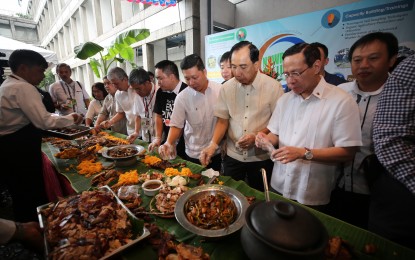
PORK CHALLENGE. Agriculture Secretary William Dar (3rd right), Health Secretary Francisco Duque (2nd right), and members of the hog industry hold a boodle fight at the Bureau of Soils and Water Management in Quezon City on Monday (Sept. 9, 2019) to show to the public that it is safe to eat pork provided it underwent sanitary and phytosanitary procedure from the National Meat Inspection System. The DA confirmed it was African swine fever that prompted the depopulation of more than 7,000 hogs in Bulacan and Rizal farms last month. (Photo courtesy of DA)
MANILA -- The Department of Agriculture (DA) on Monday confirmed it was African swine fever (ASF) that prompted the depopulation of more than 7,000 hogs in Bulacan and Rizal farms last month.
"Today, we wish to announce the result of the confirmatory Polymerase Chain Reaction (PCR) test (done in the United Kingdom). It is African swine fever positive," said DA Secretary William Dar in a press briefing held at the Bureau of Soils and Water Management.
He said 14 out of the 20 blood samples from the infected hogs sent to the United Kingdom for laboratory testing turned up positive for ASF.
Dar, however, said that the DA was verifying if the ASF strain was similar to that of Vietnam and China.
He added the DA had yet to receive reports of more hog deaths up to this time.
"To date, we believe we have successfully managed the issue, as a misstep could erode the gains and competitiveness of the country's PHP260-billion swine industry that provides and sustains livelihood of millions of Filipino families, as roughly two-thirds or 65 percent of the industry is contributed by small backyard raisers," he said.
Dar, along with Department of Health Secretary Francisco Duque, and other DA and DOH officials, hog stakeholders, and members of the private sector earlier had a boodle fight to show the public that it was safe to eat pork.
"As long as the hogs passed through the proper process of slaughtering and preparation, the public should not fear eating pork," Dar said.
"We maintain that meat and meat products -- with appropriate NMIS (National Meat Inspection Service) seal and veterinary health certificate issued by the DA-BAI (Bureau of Animal Industry) and veterinary offices of the LGUs (local government units) -- sold in public markets are safe for human consumption," he added.
Before slaughtering, a hog is validated and assessed by a veterinarian, who then issues a medical certificate. Once slaughtered, the meats are stamped with a seal from the National Meat Inspection Service, assuring that it passed the food safety measures imposed by the government, Dar said.
Strict quarantine and monitoring protocols would remain in place to protect hog farms in other parts of the country, Dar said.
The DA also suspended the ground operations in Rizal province and focused on cleaning and disinfecting operations.
"We also activated and mobilized respective Quick Response Teams (QRTs) at DA Regional Field Offices to implement complementary measures," Dar said.
"Rest assured that the DA is on top of the situation. We are prepared to respond to all scenarios. We (also) assure the public there is enough supply of pork in the market," he added.
Duque said local meat does not impose a threat to human health, and reiterated that as long as it is prepared and cooked properly, it is safe for human consumption. (PNA)
